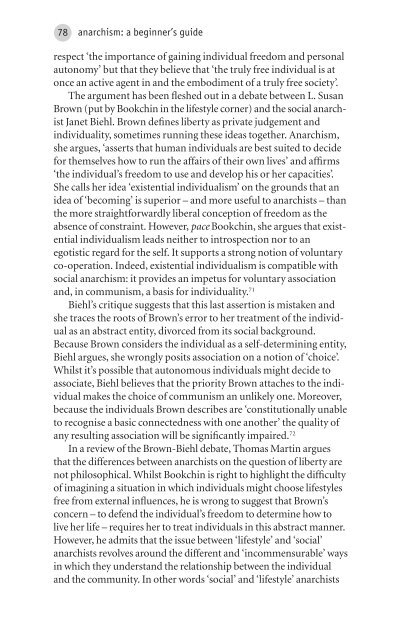o_195qg5dto17o4rbc85q1ge61i84a.pdf
Create successful ePaper yourself
Turn your PDF publications into a flip-book with our unique Google optimized e-Paper software.
78<br />
anarchism: a beginner’s guide<br />
respect ‘the importance of gaining individual freedom and personal<br />
autonomy’ but that they believe that ‘the truly free individual is at<br />
once an active agent in and the embodiment of a truly free society’.<br />
The argument has been fleshed out in a debate between L. Susan<br />
Brown (put by Bookchin in the lifestyle corner) and the social anarchist<br />
Janet Biehl. Brown defines liberty as private judgement and<br />
individuality, sometimes running these ideas together. Anarchism,<br />
she argues, ‘asserts that human individuals are best suited to decide<br />
for themselves how to run the affairs of their own lives’ and affirms<br />
‘the individual’s freedom to use and develop his or her capacities’.<br />
She calls her idea ‘existential individualism’ on the grounds that an<br />
idea of ‘becoming’ is superior – and more useful to anarchists – than<br />
the more straightforwardly liberal conception of freedom as the<br />
absence of constraint. However, pace Bookchin, she argues that existential<br />
individualism leads neither to introspection nor to an<br />
egotistic regard for the self. It supports a strong notion of voluntary<br />
co-operation. Indeed, existential individualism is compatible with<br />
social anarchism: it provides an impetus for voluntary association<br />
and, in communism, a basis for individuality. 71<br />
Biehl’s critique suggests that this last assertion is mistaken and<br />
she traces the roots of Brown’s error to her treatment of the individual<br />
as an abstract entity, divorced from its social background.<br />
Because Brown considers the individual as a self-determining entity,<br />
Biehl argues, she wrongly posits association on a notion of ‘choice’.<br />
Whilst it’s possible that autonomous individuals might decide to<br />
associate, Biehl believes that the priority Brown attaches to the individual<br />
makes the choice of communism an unlikely one. Moreover,<br />
because the individuals Brown describes are ‘constitutionally unable<br />
to recognise a basic connectedness with one another’ the quality of<br />
any resulting association will be significantly impaired. 72<br />
In a review of the Brown-Biehl debate, Thomas Martin argues<br />
that the differences between anarchists on the question of liberty are<br />
not philosophical. Whilst Bookchin is right to highlight the difficulty<br />
of imagining a situation in which individuals might choose lifestyles<br />
free from external influences, he is wrong to suggest that Brown’s<br />
concern – to defend the individual’s freedom to determine how to<br />
live her life – requires her to treat individuals in this abstract manner.<br />
However, he admits that the issue between ‘lifestyle’ and ‘social’<br />
anarchists revolves around the different and ‘incommensurable’ ways<br />
in which they understand the relationship between the individual<br />
and the community. In other words ‘social’ and ‘lifestyle’ anarchists




